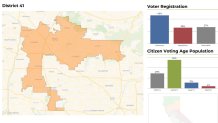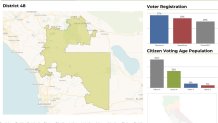As California pushes to eclipse Texas’ gerrymandering effort to secure more Republican-held seats in the House of Representatives at midterm elections, the first draft of the newly drawn congressional maps became public Friday.
This came a day after Governor Gavin Newsom held a news conference in LA’s Little Tokyo to announce a special election in November to ask for voters’ approval on the new maps. He also had said the redrawn maps would become available this week.
The five California Republican-held seats that Newsom was eyeing to squeeze out include Ken Calvert’s District 41, which includes Riverside County, and Darrell Issa’s District 48, which includes parts of San Diego county.
One of the most notable changes in the new maps is District 41, which, under the proposal, would be moving to an entirely different part of Southern California.
Currently, Calvert’s district is in the southeast portion of California, including Idyllwild, Rancho Mirage and Palm Springs.
But under the new proposed maps, his district would include Lakewood, Bellflower, Downey as well as Brea and La Habra.

Darrell Issa won’t be seeking reelection for District 48, but his successor would face a different pool of constituents as the district stretches out into the Palm Springs area as well as more parts of San Diego County.
According to the analysis by the Democratic Congressional Campaign Committee, the newly drawn district will include more Democrat-leading voters than Republican with about one third of voters being Latinos.

Julie Merz of the Democratic Congressional Campaign Committee said in a letter to the state legislature that she believes the new maps would “serve the best interest of California voters” as the deep blue state tries to push back against Texas’ effort to gerrymander and drive out Democratic congressmembers.
“It allows for more compact districts than in the current Commission-drawn map, keeps more communities and neighborhoods together, splits fewer cities, and makes minimal disruptions to the Commission-drawn map so as to impact as few residents as possible,” Merz said.
California voters are asked to submit public comment by using this form.
The proposed maps are far from being finalized as the state legislature will have to review and approve. The leaders from the Democrat-led state assembly and state senate both pledged their “iron-clad commitment” to support Newsom’s plan and prevent President Trump from “rigging” the system with the revised maps.
“We will fight fire with fire,” said State Assembly Speaker Robert Rivas during a news conference last week. “We will not allow Trump’s Republican party to take the permanent control of the U.S. House of Representatives.”
California Senate President Pro Tempore Senator Mike McGuire echoed the same message, promising to fight back against red states’ redistricting efforts.
“This is not a fight California picked. But it’ not a fight we will run from,” McGuire added.
Texas and California — the two most populous U.S. states — are the leading actors in a back-and-forth push to remake the balance of power in the U.S. House, kicked off when President Donald Trump called for Texas to redraw district lines with the GOP’s fragile House majority imperiled in the upcoming 2026 midterm elections.
The party that controls the White House is typically punished by voters in midterm elections.
“We are entitled to five more seats” in Texas, Trump insisted Tuesday in a CNBC interview. He pointed to California’s existing maps, which are drawn by an independent commission unlike the Texas maps crafted by a partisan legislature: “They did it to us.”
Other states — including New York, Florida and Indiana — could get into the power struggle that’s emerging as a national proxy war for control of Congress.
“Other blue states need to stand up,” Newsom said.
In response to Newsom’s plan, the California Republican congressional delegation, which makes up of nine GOP members of the House of Represenatives, condemned the plan, calling it “Newsom’s power grab.”
“As a delegation, we stand with the bipartisan majority of Californians who support California’s Independent Citizens Redistricting Commission and who voted twice to enshrine the Commission in our state’s Constitution,” the group said in a statement. “All Californians, regardless of their political affiliation, should vote NO on this attempt to eliminate the Independent Citizens Redistricting Commission’s ability to draw fair congressional districts.”
The California Republican Party had also said it would go to court to fight the redistricting effort in the state, according to Corrin Rankin, chair of the California Republican Party.
“The California Republican Party will fight it in the courts, at the ballot box and in every community,” Rankin said.
Source link

